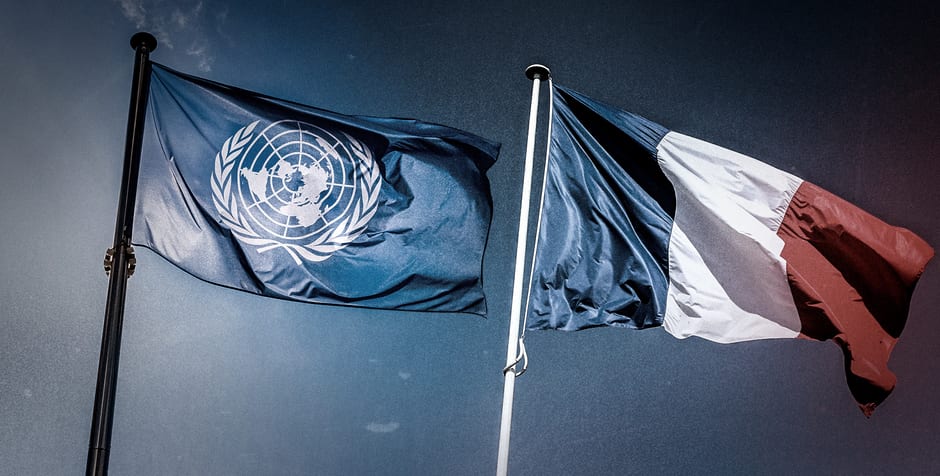UN Sounds the Alarm on France’s Radical Euthanasia Bill, Following ECLJ Petition
Listen tothis article
As a direct result of the advocacy of the European Centre for Law and Justice (ECLJ) – the ACLJ’s international affiliate – the United Nations Committee on the Rights of Persons with Disabilities (U.N. CRPD) has asked the French government to respond to serious concerns regarding a radical bill authorizing and promoting euthanasia and assisted suicide. The bill seems to target persons with disabilities, and coerces religious clinics and retirement homes to comply or face punishment.
Endorsed by Emmanuel Macron and already passed by the National Assembly, the bill awaits approval by the French Senate to become law. This bill is highly problematic in many respects. First, as a matter of principle, it violates the prohibition on killing and describes euthanasia and assisted suicide as forms of so-called “medical care,” deceptively framed as merely offering “aid in dying.” Even more alarming, it uses a subjective criteria of suffering, including individuals with mental illness and disabilities.
The proposed euthanasia procedure could occur in a shockingly quick turnaround – carried out within a week – based solely on the decision of a single physician without any judicial oversight. Families would not be allowed to oppose the killing of their loved one, and compliance with the policy would only be reviewed a posteriori, or after the patient’s death. Extremely disturbing is that medical and social institutions — including religious clinics and retirement homes — would be forced to permit euthanasia on their premises, while pharmacists would be legally required to supply the lethal drugs used. The bill even creates a new crime of obstruction, punishable with up to two years in prison and fines of €30,000, effectively criminalizing any attempt to prevent or question an assisted suicide.
To defend the lives of the vulnerable, the ECLJ’s strategy is to challenge it under international law; in particular through the U.N. Convention on the Rights of Persons with Disabilities, the international treaty adopted in 2006 that sets out the rights of persons with disabilities. Countries ratify it and are then legally bound to follow it.
In April, the ECLJ submitted a public petition to the U.N. CRPD, which is responsible for monitoring compliance with the U.N. Convention on the Rights of Persons with Disabilities by state parties. After being heard by the U.N. CRPD on May 6, the ECLJ submitted a legal brief on May 30, demonstrating that the proposed French bill violates the rights of persons with disabilities.
The ECLJ stressed that the bill effectively makes disability itself a qualifying condition for euthanasia. This sends a devastating message to people with disabilities – suggesting their lives are less worth living – and creates dangerous pressure, especially for those already facing social or economic hardships, to view euthanasia as their only option.
As a result, on June 23, in a letter addressed to France, the U.N. CRPD warned that it had “received credible information indicating that if the above-mentioned piece of legislation is approved, it would result in an infringement of the duty of the state party to respect, protect and guarantee the right to life of persons with disabilities.” With this letter, the U.N. CRPD initiated an inquiry requiring France to provide further information on the bill.
The U.N. CRPD expressed particular concern that the “proposed eligibility criteria . . . appear to be based in ableist perceptions of the quality and value of the life of persons with disabilities.” In fact, under the proposed law, a disability alone could be sufficient grounds for euthanasia or assisted suicide, if the person suffers physically or psychologically. This refers to what the U.N. CRPD calls “ableist.” It also raised concerns about the lack of “alternatives to assisted dying,” the creation of a new felony of obstructing assisted suicide, and the very short mandatory cooling-off period of only two days before euthanasia or assisted suicide can be performed.
The French government’s response to the U.N. CRPD was originally scheduled to be examined during its session in Geneva between August 11 and 29. However, the government attempted to escape its obligations by requesting to respond only at the end of August — after the session had ended. Despite this delay attempt, the U.N. CRPD will review the response and issue a public opinion. This opinion cannot simply be ignored by legislators and may also be taken into account by the French Constitutional Council if adopted.
It is extremely unusual for a U.N. Committee to intervene during a national legislative process, but in this case, it is fully justified given the dangerous nature of the bill. We must never forget that the U.N. was founded in response to the horrific crimes of Nazi Germany, including the state-sanctioned euthanasia of the innocent. When crafting the Universal Declaration of Human Rights, the drafters made clear: Euthanasia is always a crime and can never be justified. Its prohibition is a fundamental safeguard of human dignity and the right to life.
The U.N. CRPD will continue monitoring the French legislative process, just as it urged Canada last April to review its own laws on this very issue. This ongoing oversight provides powerful support for those defending the life and dignity of society’s most vulnerable.
The ECLJ and ACLJ are long proponents of life, opposing efforts to expand abortion and legalize euthanasia. Join our effort to fight for life across all 50 states, add your voice to our petition: Defend Life, Defeat Abortion in All 50 States.
